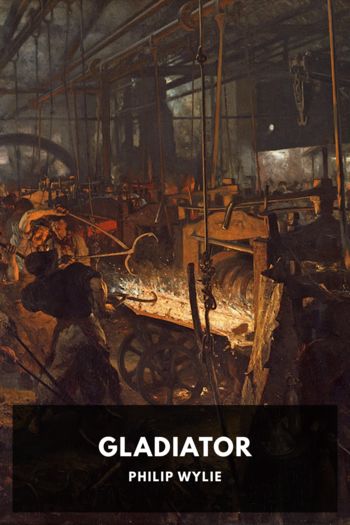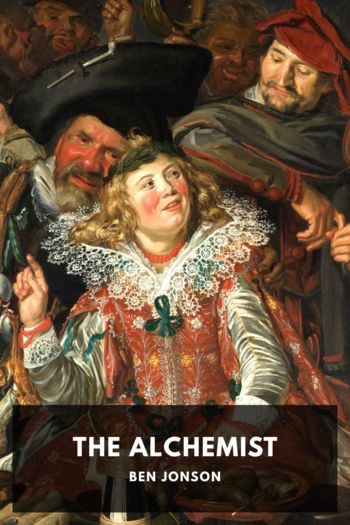Gladiator - Philip Wylie (classic novels for teens txt) 📗

- Author: Philip Wylie
- Performer: -
Book online «Gladiator - Philip Wylie (classic novels for teens txt) 📗». Author Philip Wylie
“You’re a strange man,” she said finally. That was to be the password. “Yes?”
“I’ve watched you every day from the kitchen window.” Her depression had gone now and she was talking with a vague excitement. “Have you?”
“Do you mind if we pretend for a minute?”
“I’d like it.”
“Then let’s pretend this is a magic carpet and we’ve flown away from the world and there’s nothing to do but play. Play,” she repeated musingly. “I’ll be Roseanne and you’ll be Hugo. You see, I found out your name from the letters. I found out a lot about you. Not facts like born, occupation, father’s first name; just—things.”
He dared a little then. “What sort of things, Roseanne?” She laughed. “I knew you could do it! That’s one of them. I found out you had a soul. Souls show even in barn-yards.
You looked at the peonies one day and you played with the puppies the next. In one way—Hugo—you’re a failure as a farm hand.”
“Failure?”
“A flop. You never make a grammatical mistake.” She saw his surprise and laughed again. “And your manners—and, then, you understood French. See—the carpet is taking us higher and farther away. Isn’t it fun! You’re the hired man and I’m the farmer’s wife and all of a sudden—we’re—”
“A prince and princess?”
“That’s exactly right. I won’t pretend I’m not curious—morbidly curious. But I won’t ask questions, either, because that isn’t what the carpet is for.”
Hugo’s shoulders shook. “Poor Princess Roseanne. And what do I think about you, then—”
She held up her hand. “Don’t tell me, Hugo. I should be sad. After all, my life—”
“May be what it does not appear to be.”
She took a brittle pine twig and dug in the mold of the needles until it broke. “Ralph—was different once. He was a chemist. Then—the war came. And he was there and a shell—”
“Ah,” Hugo said. “And you loved him before?”
“I had promised him before. But it changed him so. And it’s hard.”
“The carpet,” he answered gently. “The carpet—”
“I almost dropped off, and then I’d have been hurt, wouldn’t I?”
“A favor for a favor. I’m not a great man, but I hope to be one. I have something that I think is a talent. Let it go at that. The letters come from my father and mother—in Colorado.”
“I’ve never seen Colorado.”
“It’s big—”
“Like the nursery of the Titans, I think,” she said softly, and Hugo shuddered. The instinct had been too true.
Her eyes were suddenly stormy. “I feel old enough to mother you, Hugo. And yet, since you came, I’ve been a little bit in love with you. It doesn’t matter, does it?”
“I think—I know—”
“Sit closer to me then, Hugo.”
The sun had passed the zenith before they spoke connectedly again. “Time for the magic carpet to come to earth,” she said gayly.
“Is it?”
“Don’t be masculine any longer—and don’t be rudely possessive. Of course it is. Aren’t you hungry?”
“I was hungry—” he began moodily.
“All off at earth. Come on. Button me. Am I a sight?”
“I disregard the bait.”
“You’re being funny. Come. No—wait. We’ve forgotten the orchids. I wonder if I really came for orchids. Should you be terribly offended if I said I thought I did?”
“Extravagantly offended.”
Cane returned late in the day. The cows had been sold—“I even made five hundred clear and above the feeding and labor on the one with the off leg. She’ll breed good cattle.” The barns were as clean as a park, and Roseanne was singing as she prepared dinner.
With the approach of autumn weather Roseanne caught a cold. She continued her myriad tasks, but he could see that she was miserable. Even Cane sympathized with her gruffly. When the week of the cattle show in New York arrived, the cold was worse and she begged off the long trip on the trucks with the animals. He departed alone with his two most precious cows, scarcely thinking of her, muttering about judges and prizes.
Again she came out to the barn. “You’ve made me a dreadful hypocrite.”
“I know it.”
“You were waiting for me! Men are so disgustingly sure of everything!”
“But—”
“I’ve made myself cough and sniffle until I can’t stop.”
Hugo smiled broadly. “All aboard the carpet… .”
They lay in a field that was surrounded by trees. The high weeds hid them. Goldenrod hung over them. “Life can’t go on—”
“Like this,” he finished for her.
“Well—can it?”
“It’s up to you, Roseanne. I never knew there were women—”
“Like me? You should have said ‘was a woman.’ “
“Would you run away with me?”
“Never.”
“Aren’t we just hunting for an emotion?”
“Perhaps. Because there was a day—one day—in the pines—”
He nodded. “Different from these other two. That’s because of the tragic formation of life. There is only one first, only one commencement, only one virginity. Then—”
“Character sets in.”
“Then it becomes living. It may remain beautiful, but it cannot remain original.”
“You’d be hard to live with.”
“Why, Roseanne?”
“Because you’re so determined not to have an illusion.”
“And you—”
“Go on. Say it. I’m so determined to have one.”
“Are we quarreling? I can fix that. Come closer. Roseanne.” Her face changed through delicate shades of feeling to tenderness and to intensity. Abruptly Hugo leaped to his feet.
The rhythmic thunder rode down upon them like the wind. A few yards away, head down, tail straight, the big bull charged over the ground like an avalanche. Roseanne lifted herself in time to see Hugo take two quick steps, draw back his fist, and hit the bull between the horns. It was a diabolical thing. The bull was thrown back upon itself. Its neck snapped loudly. Its feet crumpled; it dropped dead. Twenty feet to one side was a stone wall. Hugo picked up a hoof and dragged the carcass to the base of the wall. With his hand he made an indenture in the rocks, and over the face of the hollow he splashed the bull’s blood. Then he approached Roseanne. The whole episode had occupied less than a minute.
She had hunched her shoulders together, and her face was pale. She articulated with difficulty. “The bull”—her hands twitched—“broke in here—and you hit him.”
“Just in time, Roseanne.”
“You killed him. Then—why did you drag him over there?’
“Because.” Hugo answered slowly, “I thought it would be better to make it seem as if he charged the wall and broke his neck that way.”
Her frigidity was worse than any hysteria. “It isn’t natural to be able to do things like that. It isn’t human.”
He swallowed; those words in that stifled intonation were very familiar. “I know it. I’m very strong.”
Roseanne looked down at the grass. “Wipe your hand, will you?”
He rubbed it in the earth. “You mustn’t be frightened.”
“No?” She laughed a little. “What must I be, then? I’m alive, I’m crawling with terror. Don’t touch me!” She screamed and drew back.
“I can explain it.”
“You can explain everything! But not that.”
“It was an idiotic, wild, unfair thing to have happen at this time,” he said.
“My life’s like that.” He looked beyond her. “I began wanting to do tremendous things. The more I tried, the more discouraged I became. You see, I was strong. There have been other things figuratively like the bull. But the things themselves get littler and more preposterous, because my ambition and my nerve grows smaller.” He lowered his head. “Some day—I shan’t want to do anything at all any more. Continuous and unwonted defeat might infuriate some men to a great effort. It’s tiring me.” He raised his eyes sadly to hers. “Roseanne—!”
She gathered her legs under herself and ran. Hugo made no attempt to follow her. He merely watched. Twice she tripped and once she fell. At the stone wall she looked back at him. It was not necessary to be able to see her expression. She went on across the fields—a skinny, flapping thing—at last a mere spot of moving color.
Hugo turned and stared at the brown mound of the bull. After a moment he walked over and stood above it. Its tongue hung out and its mouth grinned. It lay there dead, and yet to Hugo it still had life: the indestructibility of a ghost and the immortality of a symbol. He sat beside it until sundown.
At twilight he entered the barn and tended the cows. The doors of the house were closed. He went without supper.
Cane returned jubilantly later in the evening. He called Hugo from the back porch.
“Telegram for you.”
Hugo read the wire. His father was sick and failing rapidly “I want my wages,” he said. Then he went back to the barn His trifling belongings were already wrapped in a bundle Cane reluctantly counted out the money. Hugo felt nauseated and feverish. He put the money in his pockets, the bundle under his arm; he opened the gate, and his feet found the soft earth of the road in the darkness.
HUGO had three hours to wait for a Chicago train. His wages purchased his ticket and left him in possession of twenty dollars. His clothing was nondescript; he had no baggage. He did not go outside the Grand Central Terminal, but sat patiently in the smoking-room, waiting for the time to pass. A guard came up to him and asked to see his ticket. Hugo did not remonstrate and produced it mechanically; he would undoubtedly be mistaken for a tramp amid the sleek travelers and commuters.
When the train started, his fit of perplexed lethargy had not abated. His hands and feet were cold and his heart beat slowly. Life had accustomed him to frustration and to disappointment, yet it was agonizing to assimilate this new cudgeling at the hands of fate. The old green house in the Connecticut hills had been a refuge; Roseanne had been a refuge. They were, both of them, peaceful and whimsical and they had seemed innocent of the capacity for great anguish. Every man dreams of the season-changed countryside as an escape; every man dreams of a woman on whose broad breast he may rest, beneath whose tumbling hair and mothlike hands he may discover forgetfulness and freedom. Some men are successful in a quest for those anodynes. Hugo could understand the sharp contours of one fact: because he was himself, such a quest would always end in failure. No woman lived who could assuage him; his fires would not yield to any temporal powers.
He was barren of desire to investigate deeper into the philosophy of himself. All people turned aside by fate fall into the same morass. Except in his strength, Hugo was pitifully like all people: wounds could easily be opened in his sensitiveness; his moral courage could be taxed to the fringe of dilemma; he looked upon his fellow men sometimes with awe at the variety of high places they attained in spite of the heavy handicap of being human—he looked upon them again with repugnance—and very rarely, as he grew older, did such inspections of his kind include a study of the difference between them and him made by his singular gift.
In such a painful and painstaking mood he was carried over the Alleghenies and out on the Western plains. He changed trains at Chicago without having slept, and all he could remember of the journey was a protracted sorrow, a stabbing consciousness of Roseanne, dulled by his last picture of her, and a hopeless guessing of what she





Comments (0)